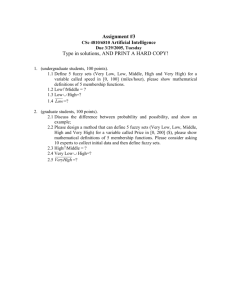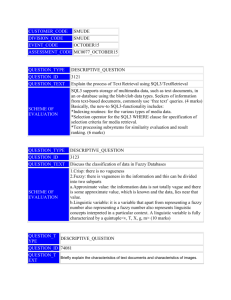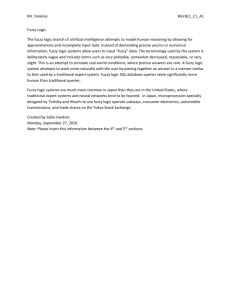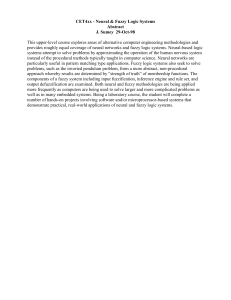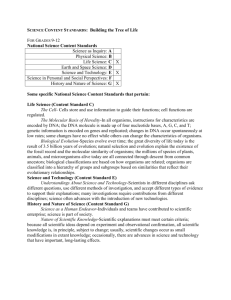FUZZINESS - Process Reality
advertisement
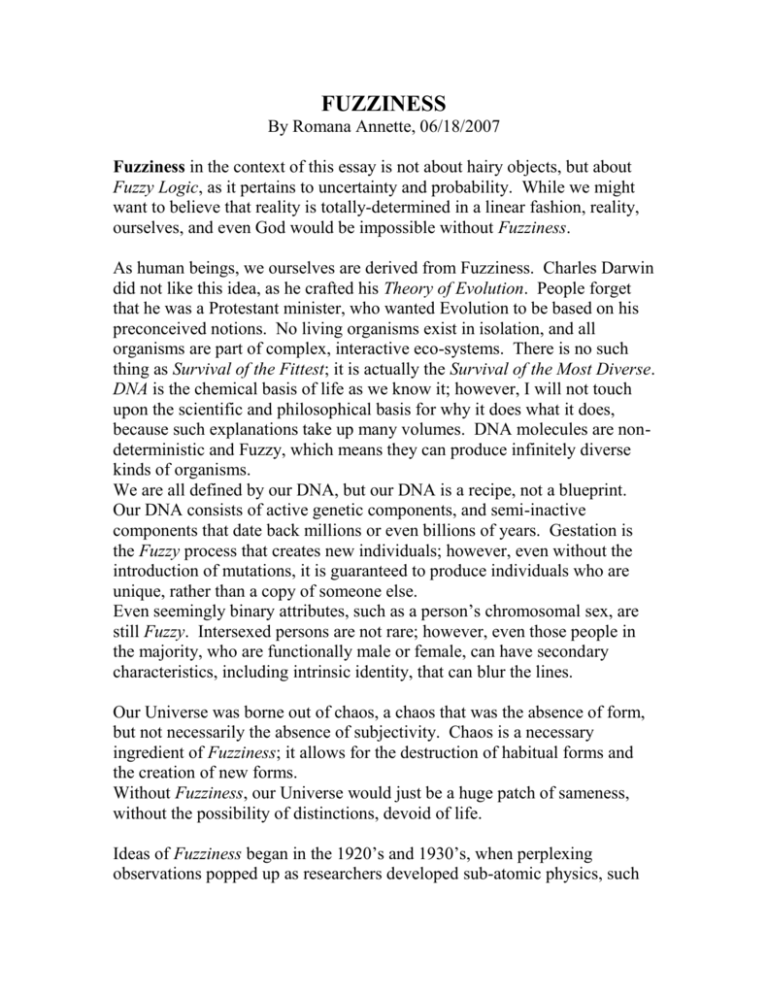
FUZZINESS By Romana Annette, 06/18/2007 Fuzziness in the context of this essay is not about hairy objects, but about Fuzzy Logic, as it pertains to uncertainty and probability. While we might want to believe that reality is totally-determined in a linear fashion, reality, ourselves, and even God would be impossible without Fuzziness. As human beings, we ourselves are derived from Fuzziness. Charles Darwin did not like this idea, as he crafted his Theory of Evolution. People forget that he was a Protestant minister, who wanted Evolution to be based on his preconceived notions. No living organisms exist in isolation, and all organisms are part of complex, interactive eco-systems. There is no such thing as Survival of the Fittest; it is actually the Survival of the Most Diverse. DNA is the chemical basis of life as we know it; however, I will not touch upon the scientific and philosophical basis for why it does what it does, because such explanations take up many volumes. DNA molecules are nondeterministic and Fuzzy, which means they can produce infinitely diverse kinds of organisms. We are all defined by our DNA, but our DNA is a recipe, not a blueprint. Our DNA consists of active genetic components, and semi-inactive components that date back millions or even billions of years. Gestation is the Fuzzy process that creates new individuals; however, even without the introduction of mutations, it is guaranteed to produce individuals who are unique, rather than a copy of someone else. Even seemingly binary attributes, such as a person’s chromosomal sex, are still Fuzzy. Intersexed persons are not rare; however, even those people in the majority, who are functionally male or female, can have secondary characteristics, including intrinsic identity, that can blur the lines. Our Universe was borne out of chaos, a chaos that was the absence of form, but not necessarily the absence of subjectivity. Chaos is a necessary ingredient of Fuzziness; it allows for the destruction of habitual forms and the creation of new forms. Without Fuzziness, our Universe would just be a huge patch of sameness, without the possibility of distinctions, devoid of life. Ideas of Fuzziness began in the 1920’s and 1930’s, when perplexing observations popped up as researchers developed sub-atomic physics, such as the occurrence of random outcomes that exhibited only a few discrete values. Werner Heisenberg was credited with the Uncertainty Principle, that one cannot know both the position and the momentum of any sub-atomic particle at the same time. This was followed by the work Erwin Schrödinger, Niels Bohr, and others in the development of Quantum Mechanics, where matter exhibited both the characteristics of particles and waves at the same time, while following rules of probability. Science seemed to have become highly philosophical, which caught the attention of Process Theologian Alfred North Whitehead (1861-1947,) as he developed his ideas about Process Theology, which had been influenced by the New Thought philosophers David and Horatio Dresser. Whitehead realized the Quantum Mechanics had philosophical problems, but he was unable to devise a better theory. So, the existence of Fuzziness has been obvious for a long time, but it begs the question why the Universe is Fuzzy in the first place. Fuzziness can arise in a system if it is over-defined, such as is the case for DNA, where the process that creates an organism must filter out all but five percent of the available genetic code. Fuzziness can arise if there are simply too many components to construct a linear model. Our bodies consist of trillions of individual cells, so Fuzzy Logic, rather than linear logic, must be used to describe the operation of our bodies. However, over-definition is apparently, at first, not a problem at sub-atomic levels, so there has been a constant search for other mechanisms. Superstring Theory, a development of the 1990’s, creates a plausible mechanism for the source of the Fuzziness. In Superstring Theory, the four dimensions that we see in our space-time continuum are not all that is; there have to be at least seven other dimensions to bind matter, energy, gravity, and all other constituents of the Universe into one unified model. So, ordinary matter, even at sub-atomic levels, can be said to be overdefined in the sense that the addition of more physical constants from other dimensions creates equations of state that have more than one solution for a given situation. Multiple solutions for the same situation are the basis of Fuzziness. This allows for an Objective Reality filled with matter, energy, stars, planets, galaxies, black holes, and so forth. The objective Universe is in a state of constant motion and transformation; however, while it is highly nondeterministic, outcomes not allowed by the laws of physics cannot occur. DNA is the bridge from Objective Reality to Subjective Realty. Evolution can create limitless kinds of organisms, and, in turn, organisms can devise all sorts of ways to manipulate Objective Reality. In this case, Fuzziness gives rise to novel outcomes, such as plants, animals, people, houses, cities, cars, television sets, sexuality, marriage, divorce, war, and so forth. None of this can be predicted by simply examining the raw atomic and molecular constituents. It should be noted that many people feel that Objective Reality is just mindless stuff happening, and is therefore irrelevant. This ignores the fact that Objective Reality should be considered sacred, since it supplies the important elemental basis of all the rest of reality. The search for God in Objective Reality has proven to be fruitless, leading many to assert that God does not exist, at least not in an objective sense. Philosophically, a purely subjective God is a lot more plausible, but arguments can get lost in unprovable semantics. Many people only want a God who can manipulate celestial fireworks, rather than a God possessing an infinite love and compassion, who helps us lead and enjoy our own lives. People shiver that the subjective nature of God might also be Fuzzy. Whitehead speculated that God had a lot to do with Subjective Reality, so it is only a small leap of logic to suggest that God and Subjective Reality are an essential unity. Suddenly, God becomes extremely elusive and is no more knowable than any other philosophical concept. Charles Hartshorne (1897-2000) carried this idea even farther with his concept of panentheism. In panentheism, God is omniscient in the sense of knowing what has happened, but the future is Fuzzy, so God cannot concretely foresee future outcomes. However, if God is the ultimate enjoyer of reality, there can be no enjoyment of pat outcomes. So, God embraces all outcomes with a kind of perfect Love, simply stated as the Love of God. John F. Haught (1942 - ) has added an interesting consequence of Fuzziness. Science Fiction has explored the consequences of time travel, especially in relation to creating and avoiding paradoxes. However, when Fuzziness is factored in, no historical events can repeat themselves, because all of history was filled with non-deterministic options. To avoid a new kind of paradox, time travel would have to create a new timeline, since history could never repeat itself anyway.

